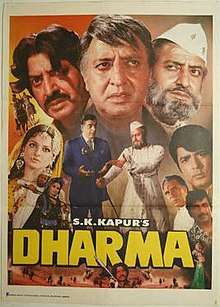Dharma (1973 film)
Dharma is a 1973 Bollywood action film directed by Chand. The film stars Pran in the title role. The rest of the cast includes Ajit and the pair Navin Nischol and Rekha. The film became a "Superhit" at the box office.[1] It was remade into the Telugu film Na Pere Bhagavan (1976). The film Dharma is also known for its music composed by the duo of Sonik-Omi and is especially famous for the qawwali sung by Mohammad Rafi in the sequence between Pran and Bindu. A few other songs were also nicely tuned and presented.
| Dha | |
|---|---|
 | |
| Directed by | Chand |
| Produced by | S. K. Kapur |
| Written by | Ehsan Rizvi |
| Screenplay by | K. B. Pathak |
| Story by | Chand |
| Starring | |
| Music by | Sonik Omi |
| Cinematography | B. Gupta |
Production company | Kapur Films |
| Distributed by | Kapur Films |
Release date | 1973 |
Running time | 138 mins |
| Country | India |
| Language | Hindi |
Plot
Sevak Singh Dharma is a dreaded dacoit living in isolation with his followers Bhairav Singh (Rajan Haksar), Mangal Singh (Madan Puri) and his wife Parvati (Geeta Siddharth) amongst others. He kills Bhairav for betraying his trust during a police encounter. While escaping in a boat, both his young son, Suraj, and wife are hit by gunfire by inspector Ajit Singh (Ajit) and considered drowned, while he survives and lands up in a city as the feared dacoit, Chandan Singh. Chandan Singh takes revenge on Ajit Singh's family and abducts his wife Asha and daughter Radha (both played by Rekha). Asha gets killed accidentally while Radha is rescued by a prostitute. Flash forward: Ajit Singh is now the Inspector General of Police; Chandan Singh is impersonating Nawab Sikander Bakht. Radha is a dancer who flips for Raju (Navin Nischol) Chandan's second-in-command. In time, Chandan tells Ajit that she is his daughter, and he should take charge of her. Even though Ajit suspects Raju's true identity, he admits him into the police force with the explicit duty of arresting Chandan who, after the truth about him comes in the open, is on the run. Bottles of blood and bullets run amuck in sequences leading towards the climax; the truth about Raju (or Suraj), now a police inspector, is revealed in the encounter between father and son. Chandan gives himself up to the police.[2]
Cast
- Pran as Sevak Singh / Chandan Singh / Dharma
- Navin Nischol as Suraj / Raju
- Rekha as Mrs. Asha Singh / Radha (Double Role)
- Ajit as Inspector Ajit Singh
- Madan Puri as Mangal Singh
- Ramesh Deo as Chaman Singh
- Mohan Choti as Car Mechanic
- Asit Sen as Seth Garib Das
- Anjali Kadam as Mrs. Parvati Singh
- Chandrashekhar
- Rajan Haksar as Bhairon Singh
- Murad as Seth
- Sonia Sahni as Cabaret Dancer #3
- Jayshree T. as Cabaret Dancer #4
- Faryal as Cabaret Dancer #2
Crew
- Stunt - A. Gani
- Art - D. S. Malvankar
- Choreography - Surya Kumar
- Audiography - Harbans Singh[3]
Soundtrack
Lyrics written by Verma Malik & music by Sonik-Omi.
| # | Song | Singer |
|---|---|---|
| 1 | "Raaz Ki Baat Keh Doon To" | Asha Bhosle, Mohammed Rafi |
| 2 | "Main Teri Gunahgaar Hoon" | Asha Bhosle, Mohammed Rafi |
| 3 | "Aur Saaqi Jo Kal Ko Hai Bachi" | Asha Bhosle, Omi |
| 4 | "Naa Satra Se Upar" | Mohammed Rafi |
References
- "Archived copy". Archived from the original on 20 October 2013. Retrieved 2013-11-12.CS1 maint: archived copy as title (link)
- "Dharma reviews". hindu. Retrieved 21 September 2017.
- "Dharma Crew". cinestaan. Retrieved 21 September 2017.